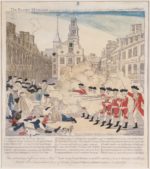Understanding the Boston Massacre
The Boston Massacre occurred on this day in 1770. This is another historical event that is not taught in its entirety in schools. The Boston Massacre represents a pivotal moment for the Black community in American history. On March 5th, 1770, a squad of British troops opened fire on a crowd of Boston residents, killing five and wounding six. This incident is known as the Boston Massacre. The episode represented a pivotal occasion in the American Revolution and the history of Black people in America.
Slavery was legal in the American colonies at the time of the Boston Massacre, and Black people were viewed more as property than as citizens. Yet they were also considered a danger to the colonial order of things. The British rulers saw the presence of Black people as a possible catalyst for revolt and disturbance at a time when they were fighting to preserve control over the colonies.
Tensions between Colonists and British Soldiers
As hostilities between the colonists and British soldiers erupted, the events leading up to the Boston Massacre started. The colonists were angry with the British government because they had placed several levies on them without their permission. The British government replied by deploying troops to Boston to preserve order as the colonists protested.
To voice their displeasure with the presence of the British soldiers, a group of colonists assembled on the evening of March 5th in front of the Customs House. When they were outnumbered, the troops grew tense and started firing into the crowd. Six more colonists suffered injuries, leaving five dead.

A Wake-Up Call for African Americans in the Fight for Freedom and Equality
A turning point in the American Revolution was the Boston Massacre. Because it highlighted the growing tensions between the colonists and the British authorities. It was a wake-up call to Black people in America, who began to see they could play a role in the struggle for freedom and equality.
Following the Boston Massacre, African Americans in America started to unite and protest against slavery and prejudice. They were crucial to the fight for freedom, and many participated in the Revolutionary War alongside white colonists.
The relevance of the Boston Massacre to black people today is illustrated by these five little-known facts:
- At the Boston Massacre, Crispus Attucks, a black man, was one of the first victims. His death motivated others to take up the fight for freedom. He is regarded as one of the earliest martyrs of the American Revolution. Attucks is revered today as an American Revolutionary War hero and a representation of Black American resistance to injustice.
- Attucks was a hero of the Boston Massacre and one of its victims. Witnesses stated that he was saying “Don’t be frightened!” as he led the attack against the British soldiers.
- One of the most critical judicial developments before the American Revolution was the trial of the British troops responsible for the Boston Massacre. A black juror was among the first to serve in one of these trials.
- The Boston Massacre received extensive coverage in the colonial press, and depictions of it in publications like newspapers and pamphlets helped turn the populace against the British. Several of these pictures featured Attucks as a Revolutionary War hero.
- The Boston Massacre significantly influenced black activism in America. It was one of the earliest occasions when black and white colonists joined together for a shared goal, inspiring the abolitionist movement’s growth in the following years. Attucks and the other black massacre victims continue to serve as an inspiration for social justice advocates today.
Conclusion
The legacy of the Boston Massacre lives on today in the struggle for racial justice and equality. It serves as a reminder that the fight for freedom and equality is ongoing and that we must continue to work towards a more just and equitable society. The March 5th, 1770 events may seem distant, but their impact on Black history in America is still felt today.


